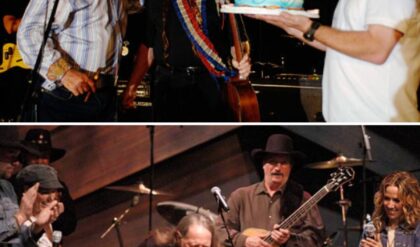The pair discuss how the series says subversive things through the metaphor of superheroes
There are few shows that can directly comment on the world we’re living in. Known for its visceral storytelling, dark humor and not-so-subtle political references, “The Boys” has held a mirror up to society since its first season launched in 2019.
“The way [the series] reflects everything that’s happening in the world really comes from this understanding, that we found very early on in the process, which is this happens to be a television show based on a comic book,” showrunner Eric Kripke tells Variety.
Each season, the Prime Video superhero series satiates core fans – with flying superheroes, laser vision and chemical injections that can cause giant tentacles to sprout from one’s chest – and fascinates viewers with narratives about unchecked power, misinformation and capitalism.
“It’s not like we were designing it to reflect reality, but we happen to be making a show about violent authoritarians who present as celebrities. Then suddenly, the world changed to reflect the show, not just in the States – all over the world,” he shares. “Suddenly we found ourselves making one of the most current shows on television.”
For Season 4, Kripke, along with the cast and team of writers and artisans, delivered sharp character writing, artful visual effects and spectacular action sequences. “We realized that we felt an obligation really, and an opportunity, to say, ‘Well, let’s make a really current show, make it reflect reality and let it be a satirical take on reality as much as possible,’” he says.
Speaking about his creative process for the penultimate season, Kripke emphasizes the importance of character development. “We spend an incredible amount of time, the vast majority of the time, talking through their psychology,” he says. “If the plot needs them to make a decision, we’re asking, ‘Well, how do they feel about that and why?’ It’s just digging deeper and deeper into all of that until you really start getting at the things that make them tick. And then once you get that, and once you feel like you’re on firm ground, how do they arc over any given episode? How does that episode build on the one before it so that there’s a season-wide arc?”
Kripke, who directed the season finale, credits the ensemble of actors for creative collaboration. “I genuinely love our cast,” he says. “To be able to work with them through the characters and then to have [my] perspective of, ‘Well, this is what we’re thinking about setting up for Season 5, which is why we want you to do this.’ To be able to have the intimate knowledge, to be under the hood of the material and understand what all the thematics are in a way that a visiting director just simply can’t.”
In the series, actor Antony Starr portrays Homelander, a “self-obsessed narcissist” supervillain doing everything in his power to assume control over the country while trying – and failing – to grow closer to his son, Ryan (Cameron Crovetti). “[Homelander] starts the season off discovering his own mortality in a way that only occurs on this show,” Starr explains. “What’s really present on his mind is the idea of legacy. So, he really wants to set up his son as the next baton carrier in Vought.” [Vought International is a huge superhero entertainment conglomerate within the show.]
Starr describes his process of portraying Homelander, joking that he gets “obsessive” when it comes to his character. “I get so granular on things, and I go down so many weird rabbit holes with this character. We don’t punch the clock and go home. You take [the work] home. It’s always sort of there, noodling away.”
Starr worked with Kripke on the nuances of Homelander’s personality. “Eric’s always been very open about any ideas that I’ve had, anything I want to add, subtract,” he says. “I come in with an idea, he knocks it back or explains why there is something the way it is. It’s a pretty organic interchange. We just kick ideas around. It’s just a great, positive, creative experience.”
Calling Starr a “thrill to watch” on set, Kripke says the pair tailor the role and play to Starr’s strengths. “One of the things that I love about his fearlessness as an actor is he’ll throw himself into a scene not knowing what Homelander’s going to do. And because he doesn’t know, the audience doesn’t know. One of the reasons Homelander is such an unexpected character is because literally Homelander doesn’t know what he’s going to do next.”
Major themes in Season 4 involve legacy, mortality and fatherhood, and they play out in Homelander’s journey. Starr points to the scene where Homelander goes through Ryan’s things and finds a picture of the teenager’s mother, Becca (Shantel VanSanten), with her husband – and Homelander’s nemesis – Billy Butcher (Karl Urban). “When that photo comes up, that is just such a knife in the heart,” Starr says. “It’s such a betrayal because it’s as much about himself and what he’s sacrificed in his own mind and what he’s gone through, what he’s put himself through, for the kid. And the kid doesn’t know. He’s just a squirrel trying to get a nut. He’s just looking for love.”
Starr adds, “One of the massive struggles with Homelander is his ego and inability to get past himself.”
A pivotal moment came in the post-credit scene of the season finale: Homelander discovers his supe father Soldier Boy (Jensen Ackles) is still alive. “There’s this intergenerational damage that gets dealt with,” Starr says. “That’s a really important thing that we look at those relationships and we built those relationships from a very deep internal perspective.”
Kripke previously teased more father-son emotion between Homelander and Soldier Boy in the fifth and final season. So, what more can fans look forward to in the final installment? “I’ve read into the season slightly, and it not only is bigger, but it’s deeper,” Starr shares.
“The more Homelander gets what he wants, the less happy he is. And that really frustrates him,” Kripke adds. “You can expect a real ratcheting up of stakes and emotion, and ‘The Boys’ really have their work cut out for them.”
Seasons 1-4 of “The Boys” are available to stream exclusively on Prime Video.




